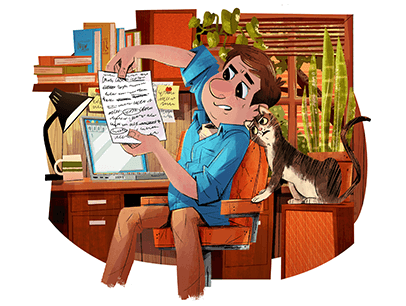
They say everybody has a book in them. If you haven’t written yours yet, it’s probably because you think it’s too hard. As I sit here in the community library writing this column, I gaze upon thousands and thousands of books by authors nobody has ever heard of, and I have to ask: How hard can it be?
Or perhaps you’re afraid your book won’t be interesting. Perusing some of the aforementioned volumes, I can assure you “interesting” is not a prerequisite. Punctuation and grammar will do. Spelling you can leave to autocorrect. And if you’re worried about finding a publisher, just go where you get everything else in your life—Amazon—and they’ll publish it for you.
Now that I’ve taken away your excuses, perhaps you’ll take the plunge. Let me make it easy for you. There are a lot of booky things you don’t need, like a Foreword. Writers usually get somebody else to write it as a kind of third-party endorsement—My Years in the Yukon by Fred Wilson. Foreword by Ellen Smith. Well, forget Ellen Smith. She may say nice things about you but she’ll take forever to do it. If you push her, she’ll feel guilty and resent you; if you don’t push, you’ll call one day and find out she’s moved to the south of France. There’s no Backword so why should there be a Foreword, anyway? Lose it.
Skip the Dedication. If the dedicatees want to see their names in print, write each of them a thank-you note and stick an iTunes gift card inside.
You can dispense with the Table of Contents, too. If you want your audience to read the book, it’s probably best not to tell them everything that’s in it on the first page, complete with page numbers.
Acknowledgements are another big no-win. Nobody reads them except the people who expect to be acknowledged. In fact, it’s the only part of the book they do read. And heaven forbid if you forget someone—which you will. They will never forgive you. Maybe it was just catching your misspelling of “accommodate” (two m’s, not one), but in their eyes that one contribution alone raised your book from mediocrity to a shot at the Pulitzer. And even forgetting a person or two, the average number of acknowledgements still comes to around 74 names, and you just don’t want to admit you needed that much help.
Acknowledgements are another big no-win. Nobody reads them except the people who expect to be acknowledged.
Worried about an Introduction? Don’t be. It’s like an opening act at a concert. The audience wants to see the main attraction but first you make them sit through some lame warm-up performance. Worse still, an Introduction is like a Prologue, and a Prologue requires an Epilogue, a finish to the finish, if you will, which means you’ll put the last period on the last sentence in the last chapter and then have to write THE END ... BUT NOT REALLY. THERE’S MORE!
Once you get into the book proper, it’s smooth sailing. If you think your book needs a map, for instance, it doesn’t. From the time Gutenberg invented the printing press, maps have done nothing but make readers turn the book upside down trying to figure them out. The color coding, the arrows, the shading, the little bars converting inches into miles ... all they illustrate is that the average person can’t read a map.
The same with graphs. Graphs are for people who understand graphs. There are six of these people in the entire world and they all work at MIT trying to solve the Twin Prime Conjecture and other unsolvable mathematical problems.
Footnotes? You must be kidding. You put a little number next to a word that refers your reader to the bottom of the page for some information in microscopic 6-point type, which, if it were worth reading, wouldn’t be a footnote. How about an Appendix, otherwise known as Here’s All the Other Stuff I Forgot to Put in the Book. Forget it. The same with an Index. How many readers want to know the page on which you mentioned “nutmeg”?
Finally, there’s the Bibliography. This could be viewed as proof of solid research ... or as a list of all the books you stole your ideas from. Why take the chance, especially when you’ll have to write “ibid.” 400 times?
Or ... you can just write fiction, in which case all you need is a title, a story, and an unlisted phone number so friends and family can’t keep asking if the book is really about them. Your choice.
John Cadley is a former advertising copywriter, freelance writer, and musician living in Fayetteville, New York. Learn more at www.cadleys.com.



 Previous
Previous

 Previous Article
Previous Article

